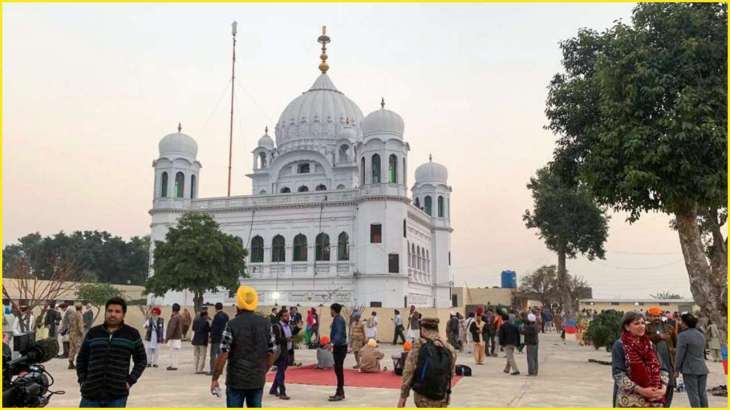
Baisakhi celebrations: The Pakistan High Commission has issued over 2,000 visas to Sikh pilgrims from India to participate in Baisakhi celebrations. During their visit, the pilgrims will visit Dera Sahib, Panja Sahib, Nankana Sahib and Kartarpur Sahib. The visas are for the celebrations from April 9 to April 18.
“On the occasion of Baisakhi celebrations, the Pakistan High Commission in New Delhi has issued 2,856 visas to Sikh pilgrims from India to participate in the annual festival from April 9 to 18 in Pakistan,” the Pakistan mission said in a release. ,
Sikh and Hindu pilgrims from India visit Pakistan every year, under the provision of a bilateral protocol on travel to religious places. Pakistani pilgrims also visit India every year under the protocol.
The Pakistan Embassy in New Delhi said in a statement that the issuance of visas to religious pilgrims by the High Commission is in line with the commitment of the Government of Pakistan to fully implement the bilateral protocol on visits to religious places between the two countries.
Sikh pilgrims will reach Pakistan via Wagah border
Indian Sikh pilgrims will reach Pakistan via Wagah border on Sunday where they will be welcomed. The pilgrims will be sent to Panja Sahib Hasan Abdal by a special train after immigration and custom clearance, news agency ANI quoted The Express Tribune as saying.
Pakistan’s in-charge Salman Sharif wished the pilgrims a “complete journey”. The statement said that Pakistan is committed to protecting the holy shrines and providing necessary facilities to the pilgrims.
1974 Pakistan-India Protocol
Issuance of visas is covered under the framework of the ‘Pakistan-India Protocol on Visit to Religious Places of 1974’. Every year, a large number of Sikh pilgrims from India visit Pakistan to observe various religious festivals and occasions. The visas issued from New Delhi are in addition to those granted to Sikh pilgrims attending these events from other countries.
As per protocol, these pilgrims, who are granted visitor visas, can travel only in groups and the number of these groups is fixed annually.
This protocol covers five Indian shrines including Ajmer’s Hazrat Moinuddin Chishti, Hazrat Nizamuddin Auliya and Hazrat Amir Khusro in Delhi, Hazrat Mujaddid Alf Sani in Sirhind Sharif, Punjab and Hazrat Khwaja Alauddin Ali Ahmed Sabir in Kaliyar Sharif.
While the 15 shrines in Pakistan which come under the protocols are Gurudwara Shri Nankana Sahib and Gurudwara Shri Panja Sahib in Rawalpindi; Samadhi of Maharaj Ranjit Singh, Shrine of Hazrat Data Ganj Bakhsh, Gurudwara Shri Dera Sahib, Gurudwara Janam Asthan, Gurudwara Deewan Khana, Gurudwara Shaheed Ganj, Singhanian, Gurudwara Bhai Tara Singh, Gurudwara of Sixth Guru, Mozang, Birthplace of Shri Guru Ram Das , Gurudwara Cheveen Padshahi, Mozang and Shrine at Sree Katasraj in Lahore; Shadani Darbar in Sindh’s Hyat Pitafi as well as Sadhu Bela in Khanpur and Mirpur Mathelo (Sindh).
Baisakhi- festivals of the Sikhs
Counted as one of the most popular festivals of the Sikhs, Baisakhi is also known as Vaisakhi or Vasakhi in different parts of the country. It is celebrated every year on 13 or 14 April in Punjab and Haryana. Celebrated with great enthusiasm, the festival marks the beginning of the new year. It is a harvest festival since the rabi crop is harvested.
On this day people prepare festive dishes and take out processions, satsangs and nagar kirtans. Everyone goes to the Gurudwara and prays to the almighty.
Apart from this, Baisakhi is also the foundation day of the Khalsa community. It is the day when Guru Gobind Singh, the tenth Guru of the Sikhs, convened a special assembly to ask people to sacrifice their lives for the sake of God. After that five people came forward who later came to be known as ‘Panj Pyare’.
For those unaware, Khalsa is the way of life and the followers of the same were nicknamed ‘Singh’, who believe that all human beings are equal. He had to wear 5K at all times- Kesh (uncut hair and beard), Kangha (comb), Kada (steel bracelet), Kachha (cotton undergarment) and Kirpan (sword).
Apart from this, the festival of Baisakhi is celebrated in different ways in different parts of India. It is said that Gautam Buddha attained Nirvana in Gaya, Bihar on the day of Baisakhi. In Assam, people celebrate Bihu, in Tamil Nadu it is known as Puthandu, in Kerala Vishu is celebrated on this day while Bengalis celebrate Pohela Boisakh.
(with inputs from agencies)
ALSO READ: ‘Dangerous ruling buffoons making fun of Pakistan’: Imran Khan criticizes govt’s actions
ALSO READ: Amidst economic turmoil, Pakistan decides to launch ‘comprehensive’ anti-terror operation